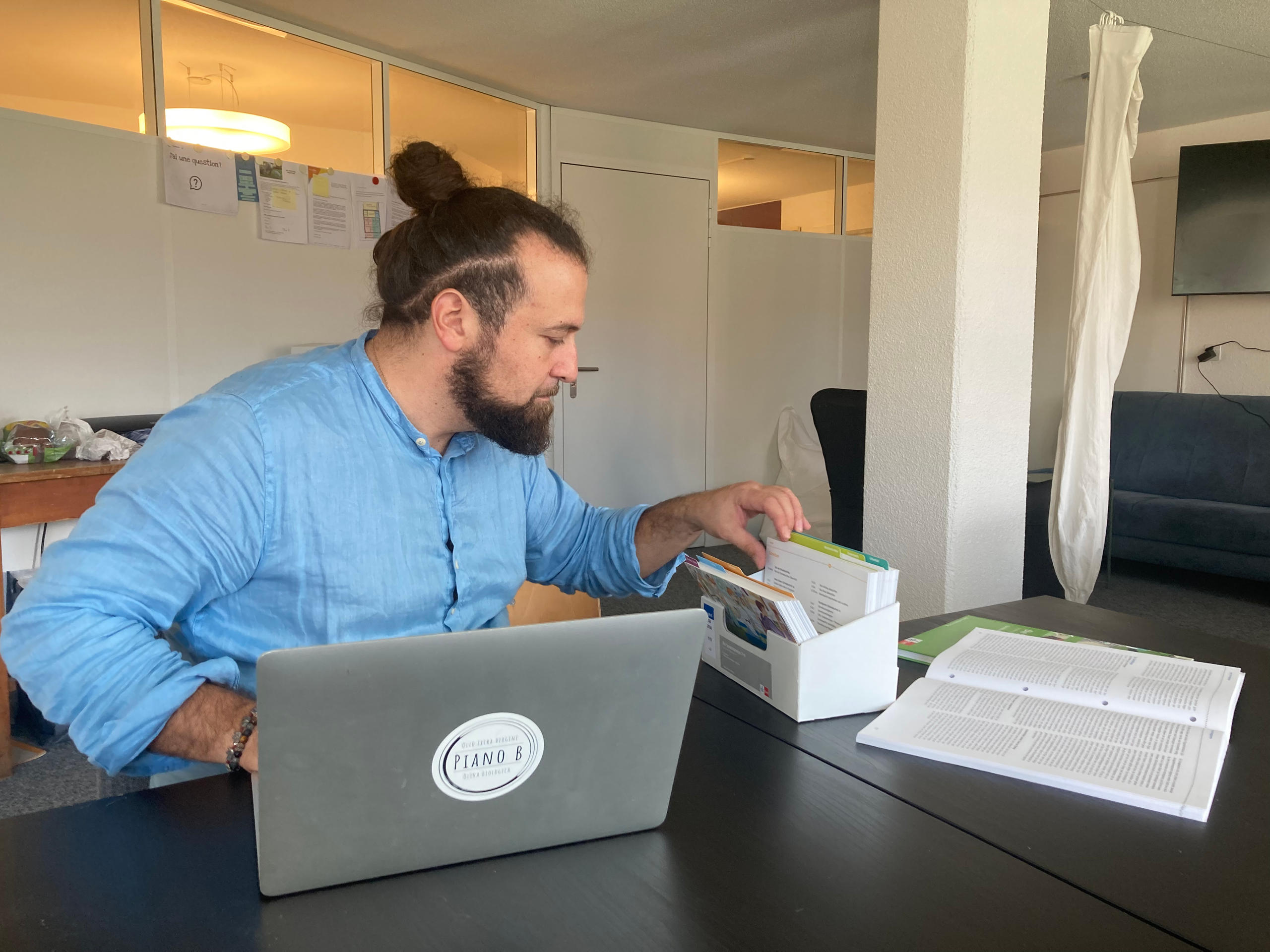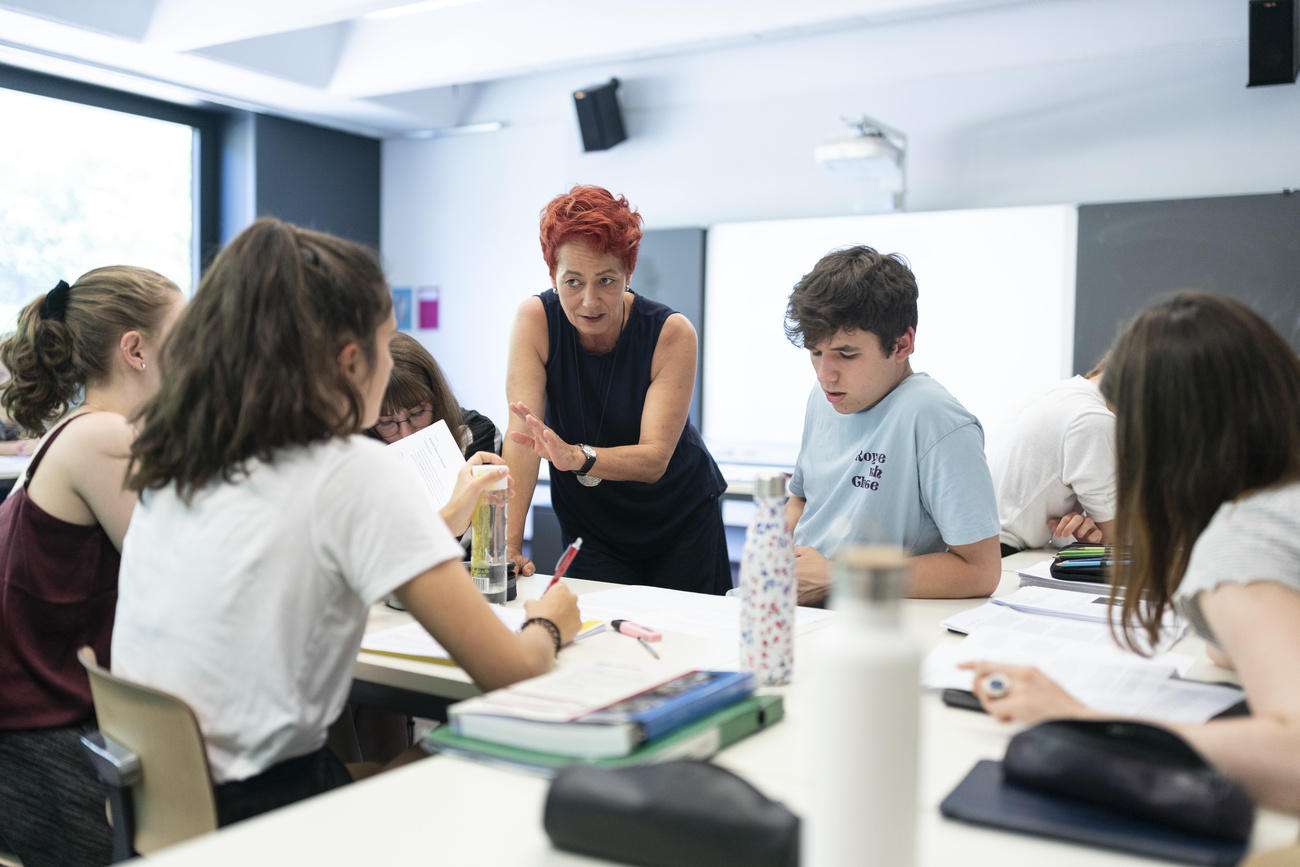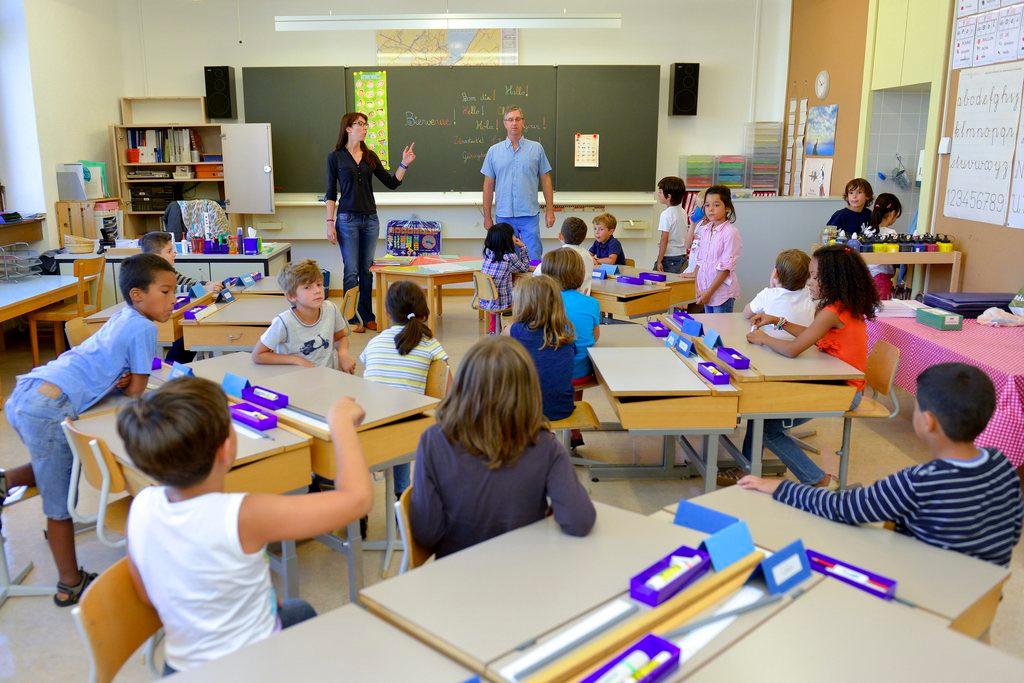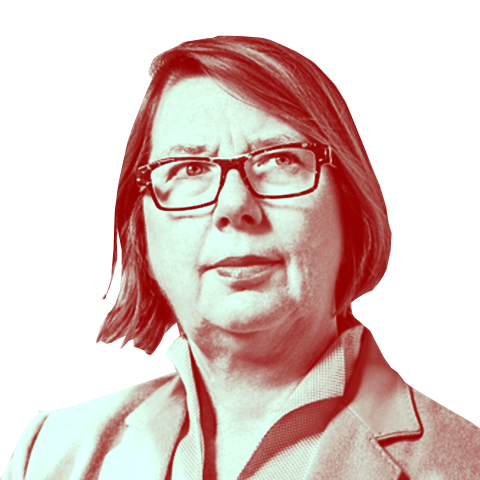‘I’ve always had a passion for teaching’

The lack of teachers is a long-standing problem in Switzerland, which is currently being solved by hiring unqualified teaching staff. SWI swissinfo.ch spoke to one of these new teachers, and to education experts, to see how the system is working – and what the future holds.
The kids call him Mauri. The teacher, full name Maurizio Audino, is around 40 years old, sports a ponytail and wears a Korean-style shirt. He teaches in Münsingen, a town of about 12,000 inhabitants, around twenty minutes’ drive from the Swiss capital Bern. The walls of the classroom are plastered with group work tasks, a class photo, a timetable, and information for parents.
“I have always been crazy about teaching,” Audino tells SWI, while the pupils work on a reading exercise in pairs. “After leaving high school I tried several kinds of jobs, and then I worked in IT. But my desire to go back to the classroom as a teacher got stronger and stronger, and so in 2017 I signed up for training at the University of Teacher Education in Bern.”
Audino also applied for a part-time position in a school. He got a 20% posting and he was teaching music and sport for the first year. “I am passionate about the guitar, and in the past I have coached junior football teams in Münsingen. So it was not such a leap for me to take on a teaching role,” Audino recalls.
Quality, but at a time cost
Audino is one of many in Switzerland who are going into teaching after gaining experience in other fields. They are a real godsend for the school system. Many cantons in German-speaking Switzerland are suffering from a chronic shortage of teachers. To fill the vacancies, many schools have taken on people without full professional teaching qualifications.
Canton Zurich now has around 500 non-qualified teachers out of a total of 18,000 teachers. In canton Bern there are 1,500 – so one in ten teachers. It’s a stop-gap solution which is not popular among teaching associations because they fear that the quality of teaching in Switzerland will decline.
Now that the school year is well advanced – the first term is almost over – is it possible to take stock of developments so far? Has there been the feared decline in the quality of teaching? We spoke to Dagmar Rösler, president of the Federation of Swiss Teachers, which represents the German-speaking part of the country, and to Thomas Minder, president of the Head Teachers’ Association, to find out.
“Most of the people who started teaching in August without completing a teaching certificate are highly motivated, and they want to give their best,” says Rösler. But first-time teachers also need the support of experienced teachers to meet all parents and children’s expectations, she adds.
Minder also sees it this way. He points to a further problem. “For the moment, the quality of teaching is not in danger. But we need to remember that support for beginner teachers takes up time and energy which established teachers should be giving to the development of our schools, for example in the area of digitalisation,” he says.
Both Rösler and Minder agree that the measures taken so far only solve the teacher shortage problem in the short term. But what of the long-term?
Future needs
Municipalities and cantons have sometimes been increasing the number of pupils in a class – there should usually be not be more than 23-25External link. As a result, in addition to hiring non-qualified personnel, existing teachers have been asked to increase their work percentages (many work part-time). The situation will only get worse in the future, as dataExternal link recently published by the Federal Statistical Office shows.
In the next ten years, the number of primary school pupils will increase by 8%, and lower secondary-level pupils by 11%. By 2031 as many as 45,000 primary teachers and 26,000 at lower secondary level will be needed, the stats office estimates.
The need will be met in part by the rise in students at Universities of Teacher Education. According to the stats office, there will be a 19% increase in student teachers between 2019 and 2029.
International issue
Switzerland is not the only country dealing with a teacher shortage. In 2018 a PISAExternal link study of head teachers in Organisation for Economic Co-operation and Development (OECD) countries found that around 27% of pupils were adversely affected by a lack of teachers.
UNESCOExternal link believes that at least 69 million new teachers are needed worldwide to meet the United Nations’ sustainable development goal on education by 2030. Just looking at Europe, at the start of the current school year, there was a shortage of 4,000 teachers in France. In North-Rhine-Westphalia, Germany’s most populous state, there were 4,400 unfilled posts. In Austria there were 8,600.
In England, between 2007 and 2019, the number of pupils remained unchanged, while teacher numbers went down by 7%External link. In Italy, the minister of education put out a call for 95,000 new teachers, but due to lack of applicants just 38,000 positions were filled. Across the Atlantic the situation is not much better. Éric Charbonnier, an education researcher with the OECD, says that the US, Canada and Australia are also grappling with this issue, due in part to a decline in the attractiveness of the teaching profession.

Making the profession more attractive
The job of teacher has lost much of the social status it enjoyed in previous generations. And making the profession more attractiveExternal link is being touted as a possible answer to filling the long-term gap between supply and demand.
“People who take up teaching often don’t have much opportunity for further professional development,” notes Rösler. “So there should be career prospects for them.”
Minder suggests the creation of a teacher leaderExternal link position: “A teacher assumes the responsibility for a particular subject within the teaching staff, say Computing, German, or History, or this person leads a group of teachers, promoting the quality of learning and teaching together with the school management.”
According to Minder, who is a primary school head in Eschlikon, in canton Thurgau, politicians tend to take a simplistic view of things. “We need to raise the bar for getting into teacher training college, not lower it as some politicians have been proposing,” says Minder. “We certainly need more teachers, but only the best should be put in front of a class. That’s the lesson from Finland, where the profession still enjoys a high status in society.”
An OECD study on Teachers and School Leaders as Lifelong LearnersExternal link has indicated that the teaching profession needs to be more financially and intellectually attractive to meet a growing demand across the world for high-quality teachers, This will require an increase in pay rates and better career options. The research involved 260,000 teachers and 15,000 school heads in 48 countries.
Audino is not yet a fully-fledged teacher – so far he has gained a Bachelor’s degree, and for his Master’s he has completed the Italian and German modules. Yet he is clearly appreciated by his pupils. This is apparent when you go into his classroom and find a relaxed atmosphere which is conducive to learning. Audino has also gained the respect of his colleagues.
“At first I thought I was considered a second-class teacher,” Audino recalls. “But I won the confidence of school management, and they gave me more and more classes and teaching hours. In four years I have gone from a 20% position to 90%.”
This is a tough workload to reconcile with family and his own studies. So this year he opened his own school, just three minutes from home. Here he is not just the teacher, but also the janitor, head teacher and social worker. A situation which suits Audino perfectly.
Edited by Virginie Mangin.
Translated from Italian by Terence McNamee/ilj

In compliance with the JTI standards
More: SWI swissinfo.ch certified by the Journalism Trust Initiative














You can find an overview of ongoing debates with our journalists here . Please join us!
If you want to start a conversation about a topic raised in this article or want to report factual errors, email us at english@swissinfo.ch.